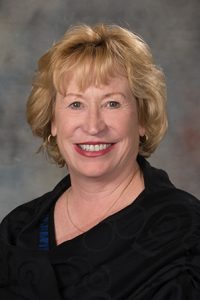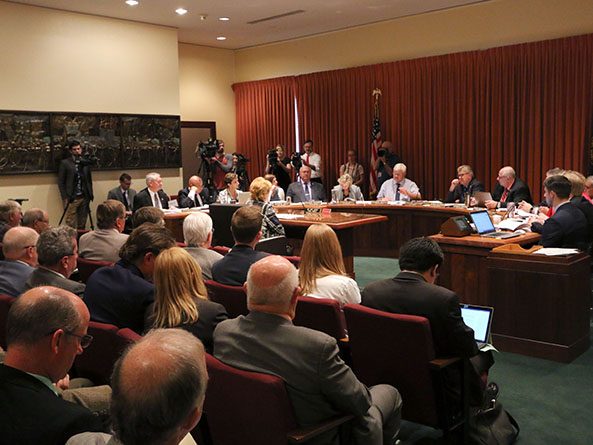Sales tax hike would decrease property taxes via additional school aid
Three legislative committees heard testimony April 24 on a proposal to direct new sales tax revenue to the state’s public schools in an effort to reduce property taxes.
Elkhorn Sen. Lou Ann Linehan, sponsor of LB289, presented an amendment that would replace the bill to a joint hearing of the Revenue, Education and Nebraska Retirement Systems committees.
The proposal would increase the state sales tax rate from 5.5 percent to 6.25 percent, increase the tax on a package of cigarettes from 64 cents to $1 and impose taxes on bottled water, candy and soft drinks, as well as storage, moving, plumbing, HVAC and certain veterinary services.
The amendment would direct the new revenue to the state’s property tax credit cash fund and from there to additional school aid.
The amendment also would reduce the value of residential, commercial and industrial property to 90 percent of its actual value for purposes of taxation. Agricultural and horticultural land would be valued for taxation at 65 percent of its actual value rather than the current 75 percent.
Linehan said the proposal also would reduce the maximum school levy and make several changes to the state’s school aid formula such that no school would receive less than one third of its funding from the state. The increase would boost Nebraska from 47th to 20th in the nation in terms of state aid to schools, she said.
“What we’re trying to do is treat everybody fairly,” Linehan said.
Jack Moles, executive director of the Nebraska Rural Community Schools Association, testified in support of the amendment, particularly the provision requiring a certain amount of state foundation aid per student.
“This would help to slow the flow of state funds from the rural areas, which has caused such a high reliance on property taxes,” he said.
Art Nietfeld also testified in support, saying the proposal would help farmers like him who pay high property taxes to support rural school districts and counties. He said the property taxes on his farm have more than doubled in the last nine years and represent roughly half of his net cropland income in an average year.
“With these constant property tax increases and lower commodity prices, we just can’t take it anymore,” Nietfeld said.
Blaine Wilcoxson testified in opposition to the amendment on behalf of several organizations representing plumbers, pipefitters and HVAC technicians. He said the proposed tax on plumbing and HVAC services would make it more expensive for Nebraskans to repair or renovate their homes.
“These are not luxury services or services that are nice to have,” Wilcoxson said.
Liz Standish, associate superintendent for business affairs at Lincoln Public Schools, also opposed the measure. She said LPS could lose up to $7 million under the proposed changes to the state’s school aid formula because the increase in state aid would not offset the district’s lost property tax revenue due to the proposed valuation reduction.
“It is very likely that we could be growing, our city could be growing, and our revenue per student could be shrinking under this proposal,” Standish said.
She said large and growing school districts that receive equalization aid—state aid intended to cover the needs of districts that cannot be met by other resources—fear that the proposal’s new funding components would grow too quickly for the state to afford them, making it likely that the Legislature would cut equalization aid to balance the state’s budget.
Also testifying in opposition was Larry Dix, executive director of the Nebraska Association of County Officials. He said the proposed valuation reduction would decrease counties’ property tax base by approximately $28 billion.
The reduction would force many counties to increase their levies in order to maintain their budgets, Dix said, but some could not because they are at or near the statutory 50-cent levy limit.
Renee Fry, executive director at OpenSky Policy Institute, also opposed the amendment. She said the proposed sales tax rate increase is too high and would fall most heavily on low- and middle-income families. The proposal also does not go far enough to broaden the state’s sales tax base by eliminating exemptions, Fry said.
Ken Herz, president of the Nebraska Cattlemen, gave neutral testimony on behalf of the Agriculture Leaders Working Group, comprising the leaders of seven agricultural organizations.
Herz said the group supports reducing property valuations statewide as well as increasing state aid to schools with new sales tax revenue. However, he said, the group opposes using the state’s property tax credit cash fund for additional school aid.
“We respectfully request that the committee not repurpose the dollars in that fund to pay for this plan until we know exactly how the newly structured program will operate,” Herz said.
No immediate action was taken on the amendment.


